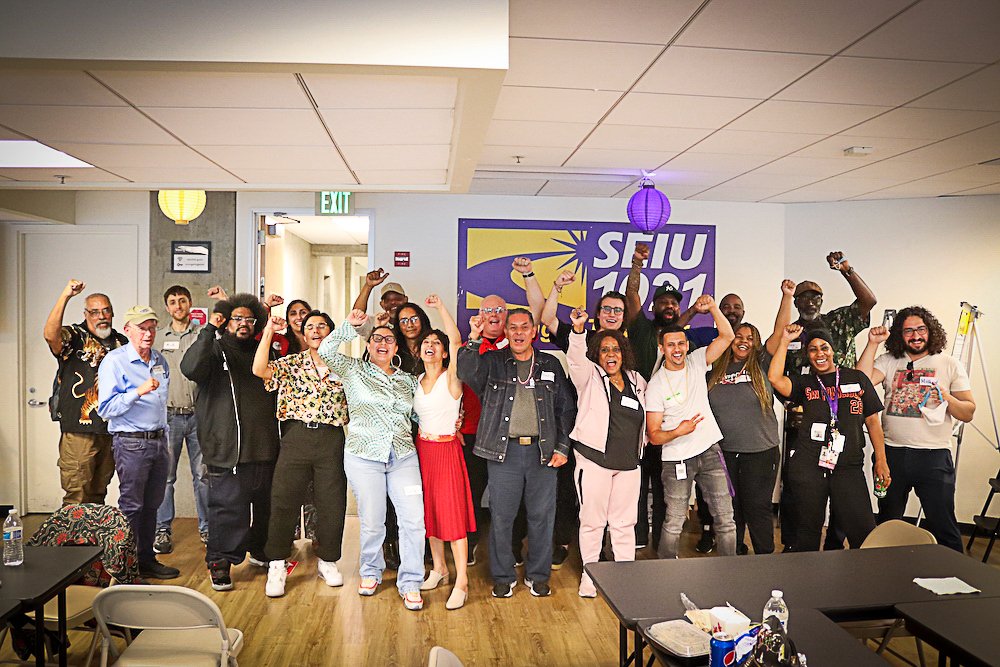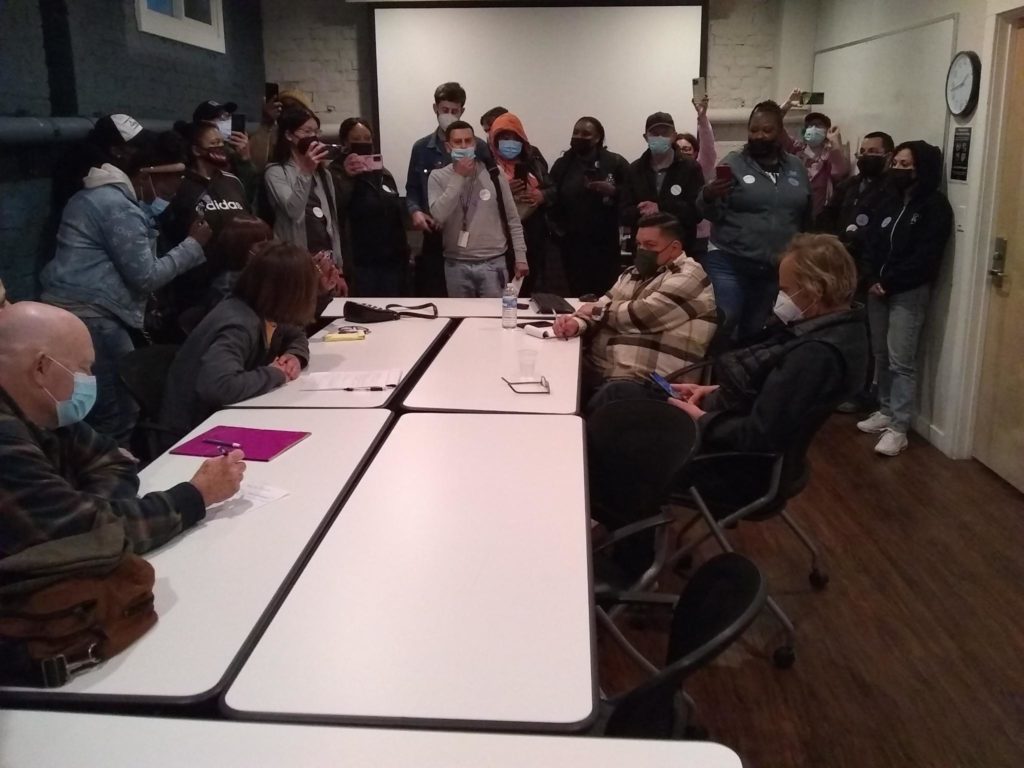Photo: Tenderloin Housing Clinic rally. Credit: SEIU 1021
Last month, workers at the San Francisco-based nonprofit Tenderloin Housing Clinic, who are members of SEIU Local 1021, voted unanimously in favor of ratifying a historic new contract. Major wins secured in their contract include an average wage increase of 22%, union membership expansion, three mental health days, extra paid holidays, longevity bonuses and more.
THC workers provide essential services for San Francisco’s homelessness and supportive housing initiatives. They work as janitors, desk clerks, caseworkers, counselors and more at 24 of the city’s single-room occupancy hotels. THC itself is one of several city-funded nonprofits that operate SROs to provide affordable housing and related services to housing insecure individuals.
During contract negotiations, workers repeatedly expressed grievances about high turnover, low pay, burnout, and overall poor working conditions that put workers perilously close to housing insecurity themselves. In fact, the dire working conditions inside many of the city’s SROs spurred the San Francisco Chronicle to publish an investigative journalism exposé on how city politicians and management at the SRO-operating nonprofits had been failing many of the people they were supposed to serve.
Francisco Dominic Angulo, a case manager at the Jefferson Hotel, gave Liberation News a brief look into what these conditions were like, sharing, “Me and [another case manager] are the only two people to deal with 107 people’s lives. And they are not regular lives. We are talking about: suicidal tendencies, people coming into my office with butcher knives — I’ve already had my life threatened a couple of times.”
Despite these grievances being known, THC management, led by executive director Randy Shaw, entered the recent round of contract negotiations seeking to strip away key benefits, enhance the disciplinary measures at their disposal, and do the bare minimum to address workers’ concerns.
Workers responded to management’s refusals to take workers’ demands seriously by organizing several pickets throughout the months-long negotiation process. At one picket in particular, workers mounted a surprise protest of Randy Shaw by crowding into a room with him during a planned negotiating session. Workers voiced their concerns directly and called on Shaw to not only respect their demands, but to also halt the anti-union tactics he had been employing throughout the negotiation process. Tactics used by Shaw included spreading anti-union propaganda within the workplace, as well as bringing on known anti-union lawyers in an attempt to attack the union itself.
When asked how the workers’ confrontation with Shaw impacted their resolve to stand their ground, Evan Oravec, THC worker and Chapter President of the THC bargaining unit in SEIU Local 1021, stated, “It meant a huge amount to THC workers to look the executive director in the eye and say ‘no.’ […] Workers had a real visceral experience about the power they have, and that’s going to carry forward.”
The pickets organized by THC workers reached their climax with a one-day strike on July 27. The strike made San Francisco history as it was the first time a city-funded supportive housing nonprofit had ever gone on strike over pay and working conditions.
In late spring, thanks to workers’ continuous organizing efforts which called to attention their working conditions, San Francisco Mayor London Breed and the Board of Supervisors approved a contract amendment that granted THC millions of additional dollars in funding through fiscal year 2023. However, despite this injection of money into THC, management still dragged their feet at the negotiating table. At nearly the same time in late May, 99% of THC workers voted to authorize a strike as the lack of progress in negotiations from THC management, and the lack of forthcoming information from the city’s Department of Homelessness and Supportive Housing, pushed workers to adopt more direct escalation tactics.
The strike proved to be an inflection point in the negotiation process, as just weeks after it took place, workers secured wage increases directly from the city. However, workers did not stop there. One of several key demands of the union was for THC law office support staff — meaning the paralegals, word processors, and intake coordinators who had historically been excluded from the union — to be granted union membership. Following the negotiated wage increases, workers were able to win not only membership for the law office support staff, but also three mental health days, additional paid holidays including Cesar Chavez Day, health care cost controls and longevity pay.
When discussing the victories in the ratified contract, workers continually expressed how much of a positive impact it would have on their lives. Hattie Patterson, a desk clerk at the Vincent Hotel, shop steward, and member of the negotiating team, shared, “I’m most excited about the longevity pay. And then the mental health days.” Another desk clerk at the Vincent Hotel, Jolissa Craig, stated, “[The victory] means a lot, not just the pay, but the mental health days to be able to [decompress].”
On July 27, the striking THC workers marched alongside supporters to the steps of the San Francisco City Hall where THC workers, SEIU Local 1021 leaders from other chapters, District 5 Supervisor Dean Preston, and PSL member and President of SMART Local 1741 Meghann Adams gave speeches. “It is so critical that you get a living wage […] Just like everybody here deserves a living wage. You deserve more than enough to survive,” said Adams during an impassioned speech. Adams continued later in her speech, “It’s absolutely critical the work that you are doing, and you deserve everything for it.” Throughout the THC workers’ contract struggle, Party for Socialism and Liberation members, many of whom live in the Tenderloin including one who is an SRO occupant, played a supporting role from bringing placards and sound equipment to joining the striking workers on July 27, keeping the energy of worker and community solidarity high throughout the day.
Expounding on the historical significance of both the strike and subsequent victory by the workers, Oravec stated, “We set a precedent for THC workers standing up, and nonprofit workers in the city in general standing up and saying that we deserve better for both ourselves, our families and the clients that we serve.” Oravec continued, “This is a breaking of the dam. This is a waking up to the fact that we can do better, we deserve better, and that when we fight, we win.”
At a celebration party held by the workers to reflect on the last nine months of struggle, workers repeatedly expressed how proud they were of their union for standing up for themselves throughout a long and never easy uphill battle.

Reflecting on the workers’ victory, case manager at the Jefferson hotel, Suleima Rosales, stated, “It took us a lot to get here. We had to fight against union-busting attorneys. We had to sit at the table, looking Randy Shaw in the eyes as he was defensive and tried to stand his ground against us. But we weren’t letting up, and here we are, enjoying the fruits of our labor.” Rosales continued, “This is what happens when you have a community that loves the people that we serve, and we show that we are willing to do everything we can, and fight for however long we need to fight, to get what’s deserved, and get what’s just.”
Patterson articulated the feelings of pride throughout the celebration, as well as the fighting spirit of the workers, declaring, “[Management] kept saying we don’t have the money, we don’t know when we’re going to get [the money], we can’t give you this, we can’t give you that, we never had this type of negotiation before — well now you do. You have different people now. You’ve got warriors today.”







